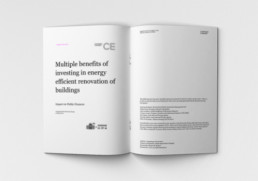80% of the Economic Potential of Energy Efficiency in buildings still untapped World Energy Outlook 2012, IEA
In its World Energy Outlook 2012 (WEO), launched in Brussels on 20th November, the International Energy Agency (IEA) underlines the unexploited potential of energy efficiency in terms of economic gains, energy security improvements and environmental protection.
The multiple benefits of energy efficiency could be achieved if the currently available technologies and practices to improve energy efficiency were systematically adopted, leading to “energy savings, by 2035, equivalent to nearly a fifth of global demand in 2010”, according to IEA Executive Director Maria van der Hoeven. “Energy efficiency is just as important as unconstrained energy supply” she explained. Referring to the buildings sector, the WEO deplores the fact that 80% of the economic potential of energy efficiency in buildings remains untapped, largely due to non-technical barriers.
As the EU’s increased dependence on imported energy is predicted to reach record levels of over 80% by 2035, the urgency to reduce the energy demand of the EU building stock is imminent. Indeed, as the sector responsible for 40% of all energy consumed in Europe, the buildings sector is highlighted by the WEO as the sector with the highest energy efficiency potential.
“Renovating Europe’s building stock has a significant mitigating potential and undeniable economic benefits” said Adrian Joyce, Director of the Renovate Europe Campaign. “The facts are there, and the technology is available! Let’s work together to seize this opportunity for every Member State to reap the benefits of greater energy security, increased economic activity and lower energy bills for their citizens.”
The figures released by the WEO lend further support to the Renovate Europe Campaign’s objectives of reducing the energy demand of the energy demand in buildings by 80% by 2050. The findings of the Multiple Benefits Study launched at Renovate Europe Day 2012 echo the WEO’s analysis of the need to act on the renovation of our building stock in order to harvest the economic, environmental and societal benefits that such action will bring.
Eco-renovations will boost states' coffers - study
EU governments could raise up to €128bn by 2017 through additional income and corporate taxes and lower social costs from renovation programmes aimed at improving buildings' energy efficiency, a new study has found.
In addition, up to €75bn could be saved on energy bills in the public sector by 2020, according to the Copenhagen Economics study commissioned by the European Alliance of Companies for Energy Efficiency in Buildings (EuroACE).
In terms of employment, eco-renovations could generate between 760,000 to 1.5 million new jobs by the end of the decade.
To facilitate investments, the authors and participants of the Renovate Europe http://www.renovate-europe.eu/ conference at which the study was presented, discussed a number of measures that could be used by member states as they prepare their 2014 renovation roadmaps http://www.endseurope.com/29041/?referrer=bulletin&DCMP=EMC-ENDS-EUROPE-DAILY made mandatory by the new Energy Efficiency Directive.
These measures include reforming property leasing regulations to allow landlords and tenants to share renovation costs and energy savings and linking property taxes to the energy labelling of buildings. Public renovation budgets should also be extended beyond the customary one year period, participants heard.
And risk-sharing programmes such as Energy Performance Contracts
(EPCs) should be promoted. With EPC, an energy service company guarantees that certain energy savings will be achieved by the installed equipment.
Marie Donnelly of the European Commission's energy department launched a new EPC campaign as it is not enough to have developed the appropriate tools, she told the participants. "Finance ministers must be convinced to use them," she stressed.
In a related development, local authorities' association Energy Cities issued a declaration in which it reaffirmed mayors' commitment to low-carbon objectives.
Follow-up: Study http://www.renovate-europe.eu/uploads/Multiple%20benefits%20of%20EE%20renovations%20in%20buildings%20-%20Full%20report%20and%20appendix.pdf by Copenhagen Economics and press releases from Energy Cities http://www.energy-cities.eu/IMG/pdf/IMAGINE_OPEN-DAYS-2012_GM_en.pdf and the European Commission's EPC campaignhttp://www.managenergy.net/news/articles/179, plus mayors' declaration http://www.energy-cities.eu/IMG/pdf/European_Mayors_NETCOM_Declaration.pdf
EU institutions raise pressure for buildings renovation
The buildings sector will benefit from new legislation and guidelines to increase the renovation of EU buildings stock, according to energy commissioner Günther Oettinger. MEP Peter Liese says renovation is a more affordable way to tackle climate change than paying for renewables.
Brussels – The buildings sector will benefit from new legislation and guidelines to increase the renovation of EU buildings stock, according to energy commissioner Günther Oettinger.
Oettinger today welcomed a recent construction sector strategy report from enterprise commissioner Antonio Tajani, which encourages the renovation of both old and new EU buildings.
“Encouraging more renovation is an excellent way to make this sector start working again. The commission is keen to create the right conditions for more private-sector investment,” Oettinger said.
He said he also believed countries would go further with the renovation of existing buildings than is currently required by law.
An energy efficiency directive (EED), agreed in June, sets countries a binding target of renovating three percent of the floor area of public-sector buildings to meet minimum energy-performance standards.
Oettinger said he was confident many member states would broaden the three-percent target to more buildings.
Peter Liese, the German MEP who led the EED through the European Parliament, said investing in buildings renovation was the only way for countries to meet EU climate targets at the same time as saving money. “A strategy built only on renewables, particularly the way we are doing it in Germany, is very expensive,” he said.
“Energy efficiency is the cost-effective part of our climate strategy,” according to Liese. MEPs debating a commission renewable-energy strategy this week warned that the cost of renewables would become increasingly difficult for national governments to justify (see here).
Liese said that adding a long-term 2050 target for the energy efficiency of building stock to the EED was “one of parliament’s biggest achievements.”
He dismissed criticism that cutting energy needs through efficiency requirements would push the need for emissions-trading permits – and therefore their price – to even lower levels.
Efficiency standards for buildings are needed because “more than 50 percent of EU emissions are not covered by the Emissions Trading System (ETS),” Liese explained. “This is mainly [emissions from] buildings.”
Because the ETS was designed for large-scale industrial emissions, rather than smaller individual amounts of CO2 from buildings, he said there was unlikely to be a “reliable” way to include buildings in the trading system.
Both Liese and Oettinger were speaking at an event to launch a new study on the ‘multiple benefits of investing in energy efficiency of buildings.’ *
The study was written by Copenhagen Economics on behalf of the industry coalition Renovate Europe.
It finds that annual investments of 41-78 billion euros in buildings renovation in the EU will bring annual benefits of 104-175 billion euros by 2020.
Lower energy bills would account for 52-75 billion euros of the annual benefits. The rest would be thanks to reduced energy subsidies, reduced pollution and improved human health.
* Euroace, Renovate Europe Day, Brussels, 11 October 2012
Renovating Europe’s buildings could boost GDP by €291 billion by 2017
Investing in building renovation could accrue up to €175 billion per year for public finances with an additional “one-off” boost to GDP in the range of €153 to €291 billion for the years up to and including 2017. This is according to a new report prepared by Copenhagen Economics for the Renovate Europe Campaign.
The report which was launched at today’s Renovate Europe Day Conference2 , shows that when the challenge of renovating the EU building stock is taken up with a high level of ambition, permanent increases in revenue for public finances will result. The report also provides a number of policy recommendations for European governments to help boost public finances through renovation. These include shifting or reducing incentives such as favourable tax treatment of heating and electricity use in buildings to encourage a lower usage, thus rendering energy efficient renovation of buildings more attractive. Modernising rent regulation to allow landlords and tenants to share the gains from energy efficient renovations is another example.
Commenting on the report, , Adrian Joyce, Campaign Director of the Renovate Europe Campaign said “We know that many Member States are still hesitant about whether or not to invest in energy efficient building renovation programmes, despite the requirements of the recently adopted Energy Efficiency Directive3 . The findings in this new report will provide the final convincing arguments for those Member States, leading them to act. Investing in energy efficiency of buildings is a good investment in the short-term, the medium-term and the long-term.”
The second edition of Renovate Europe Day focuses on the theme of Stimulating Growth and Jobs in Europe.
In his address to the Conference, Günther Oettinger, EU Commissioner for Energy said “Energy efficiency is, for the European Union, the most direct and cost-effective way to achieve our strategic goals” and he goes on to elaborate on a number of key elements of EU Policy that go in this direction. He then turns to financing and informs the audience that: “…the European Union needs to focus and redirect its financial sources to address the energy efficiency financing challenge … That is why the Commission is keen to create the right conditions to bring more private sector financing into the energy efficiency market.”
The Renovate Europe Campaign is supported by 23 companies and associations.


